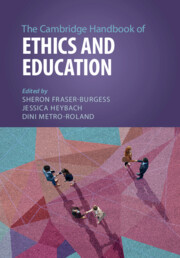Book contents
- The Cambridge Handbook of Ethics and Education
- The Cambridge Handbook of Ethics and Education
- Copyright page
- Epigraph
- Contents
- Figures
- Tables
- Contributors
- Foreword
- Preface
- Acknowledgments
- Part I Traditions in Ethics and Education
- Part II Ethics and Education in Practice
- 15 Why Educate?
- 16 The Displacement of Ethics in Education through Educational Standardization
- 17 School Health Policies and Practices
- 18 Value Creation and Happiness in Education
- 19 Children’s Rights, Childhood, and the Sovereignty of the Good
- 20 School Discipline and the Ethics of Punishment
- 21 Educating All Children
- 22 Decolonizing Curricula
- 23 The Political Necessity and Perilous Ambiguity of “Academic Freedom”
- 24 Teacher Activism and Ethical Speech
- 25 The Specter of Agreement
- 26 Philosophical Reflections on Ethics in Teaching and Teacher Education
- 27 The Ethical Dimension of Educating Educators
- Part III Emerging Ethical Pathways and Frameworks
- Index
- References
16 - The Displacement of Ethics in Education through Educational Standardization
from Part II - Ethics and Education in Practice
Published online by Cambridge University Press: 07 March 2024
- The Cambridge Handbook of Ethics and Education
- The Cambridge Handbook of Ethics and Education
- Copyright page
- Epigraph
- Contents
- Figures
- Tables
- Contributors
- Foreword
- Preface
- Acknowledgments
- Part I Traditions in Ethics and Education
- Part II Ethics and Education in Practice
- 15 Why Educate?
- 16 The Displacement of Ethics in Education through Educational Standardization
- 17 School Health Policies and Practices
- 18 Value Creation and Happiness in Education
- 19 Children’s Rights, Childhood, and the Sovereignty of the Good
- 20 School Discipline and the Ethics of Punishment
- 21 Educating All Children
- 22 Decolonizing Curricula
- 23 The Political Necessity and Perilous Ambiguity of “Academic Freedom”
- 24 Teacher Activism and Ethical Speech
- 25 The Specter of Agreement
- 26 Philosophical Reflections on Ethics in Teaching and Teacher Education
- 27 The Ethical Dimension of Educating Educators
- Part III Emerging Ethical Pathways and Frameworks
- Index
- References
Summary
This chapter examines how ethical frameworks for education have been displaced through processes of standardization both historically and contemporarily. Before turning to current examples, the chapter begins with an analysis of twentieth-century movements in philosophy of education and curriculum to illustrate how processes of standardization and educational “narrowing” emerged as the dominant educational vision for American schooling, corresponding with the push for accountability and neoliberal reform in the last few decades of the twentieth century. How this narrowing exists in today’s K-12 and higher education environment, as well as its impact on historically marginalized groups, is then explored. The chapter then turns to how the contemporary emphasis on educational technology, datafication, and digitalization reinforces educational standardization to the detriment of ethical educational possibilities. The chapter concludes with considerations of how ethical educational visions might be revived in our current era.
- Type
- Chapter
- Information
- The Cambridge Handbook of Ethics and Education , pp. 330 - 351Publisher: Cambridge University PressPrint publication year: 2024



